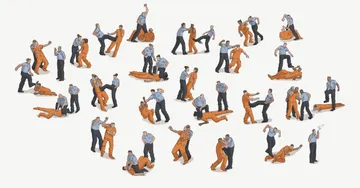“Jail has a smell. I can’t even describe it to you. Worse than a sewer.” – Corrections officer
Update: Chat is over. Check out the highlights below:
Q: What was the most surprising thing you learned while reporting this story? – Aude White
A: I was surprised at the power of the phones, and how they are a sort of currency for social power and politics. So much of internal pecking order is reflected through the phones: who gets to use the phones, at what time, and when. And phone calls are bought and sold, sometimes for packets of mayonnaise, or bags of barbeque chips. That was something I had never heard of. – Alysia Santo
Q: Who is paid more, typically, guards who work on Rikers, or NYC school teachers? – Daniel Luke
A: Great question. In New York City, after 5 years of service, a teacher can earn $50,000 - $62,000 depending on education, but a correctional officer can earn $76,000. However, the career top salary for a teacher is higher than it is for a correction officer. In NYC, a career teacher can eventually earn a six-figure salary. – Dana Goldstein
A: It's also worth noting that detaining someone at Rikers for a year costs around $94,000 - enough to hire as many as two entry-level teachers. – Nick Tabor
Q: Has the death of Kalief Browder had any effect on policies at Rikers? – Daniel Luke
A: Abolishing punitive solitary for juveniles was in the works before Kalief Browder's death, but that horror story probably strengthened Ponte's hand against skeptics in the CO union and assured Mayor de Blasio would have his back on that issue, at least. Ponte has reduced solitary for adults too (from 90 days to 30 days maximum per infraction.) When he ran Maine's prisons, Ponte felt so strongly about the damage done in solitary that he let Frontline bring in a camera crew. The resulting documentary is excruciating to watch. – Bill Keller
Q: Prison health care in NYC has been appalling since it least the 1960s. How do we hold NYC accountable for what has taken place? Where has the NYC DOHMH been all these years? – Bohdan A Oryshkevich
A: The city's answer to the appalling health and mental health care in its jails has been to end its contract with the private health provider, Corizon, and put non-profit Health and Hospitals Corporation in charge - which at least offers some continuity for inmates who come from the community and will return there. Ponte says this is an opportunity to rebuild health services from the ground up. Also de Blasio has allocated more money for mental health services outside of jail. In the decades since President Kennedy's wholesale deinstitutionalizing of mental facilities, jails in major cities have become default mental institutions. – Bill Keller
A: Another part of this problem is that discharge services are rarely provided in full to inmates leaving Rikers. Most inmates are supposed to receive a mental healthcare appointment, Medicaid access, and access to housing when they are released from Rikers, under the Brad H. v. City of New York lawsuit from 2003. But many inmates are not provided with these services, and are discharged from Rikers on their own, left to fend for themselves. Many of them decompensate upon their release and end up back in a jail or hospital. – Eli Hager
Rikers Island, not 300 feet from NYC’s LaGuardia airport, holds ten of the most notorious jails in the country. Stories of abuse and neglect, especially against adolescents and the mentally ill, dominated the news cycle in recent months. And while the city has taken steps to address those problems – by promising to end solitary for those under 21 and settling a class-action suit, we wanted to find out what life inside the jail is truly like, and how those policy changes are impacting inmates, corrections officers, and high-level officials.
Join us Monday, June 29 at 1 PM ET for a Facebook chat with Bill Keller, Dana Goldstein, Alysia Santo, and Eli Hager to find out more about the NYC jail. Each reporter interviewed people who live and work on Rikers for our story we published with New York Magazine, which you can find on newsstands today (!)
The chat will be held on New York Magazine’s Facebook page. We'll update this post with a link to the conversation as soon as it’s live.
Background reading: Here’s what former corrections chief Martin Horn thinks it will take to fix Rikers.
